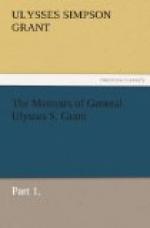During the minority of my father, the West afforded but poor facilities for the most opulent of the youth to acquire an education, and the majority were dependent, almost exclusively, upon their own exertions for whatever learning they obtained. I have often heard him say that his time at school was limited to six months, when he was very young, too young, indeed, to learn much, or to appreciate the advantages of an education, and to a “quarter’s schooling” afterwards, probably while living with judge Tod. But his thirst for education was intense. He learned rapidly, and was a constant reader up to the day of his death in his eightieth year. Books were scarce in the Western Reserve during his youth, but he read every book he could borrow in the neighborhood where he lived. This scarcity gave him the early habit of studying everything he read, so that when he got through with a book, he knew everything in it. The habit continued through life. Even after reading the daily papers—which he never neglected—he could give all the important information they contained. He made himself an excellent English scholar, and before he was twenty years of age was a constant contributor to Western newspapers, and was also, from that time until he was fifty years old, an able debater in the societies for this purpose, which were common in the West at that time. He always took an active part in politics, but was never a candidate for office, except, I believe, that he was the first Mayor of Georgetown. He supported Jackson for the Presidency; but he was a Whig, a great admirer of Henry Clay, and never voted for any other democrat for high office after Jackson.
My mother’s family lived in Montgomery County, Pennsylvania, for several generations. I have little information about her ancestors. Her family took no interest in genealogy, so that my grandfather, who died when I was sixteen years old, knew only back to his grandfather. On the other side, my father took a great interest in the subject, and in his researches, he found that there was an entailed estate in Windsor, Connecticut, belonging to the family, to which his nephew, Lawson Grant —still living—was the heir. He was so much interested in the subject that he got his nephew to empower him to act in the matter, and in 1832 or 1833, when I was a boy ten or eleven years old, he went to Windsor, proved the title beyond dispute, and perfected the claim of the owners for a consideration—three thousand dollars, I think. I remember the circumstance well, and remember, too, hearing him say on his return that he found some widows living on the property, who had little or nothing beyond their homes. From these he refused to receive any recompense.




